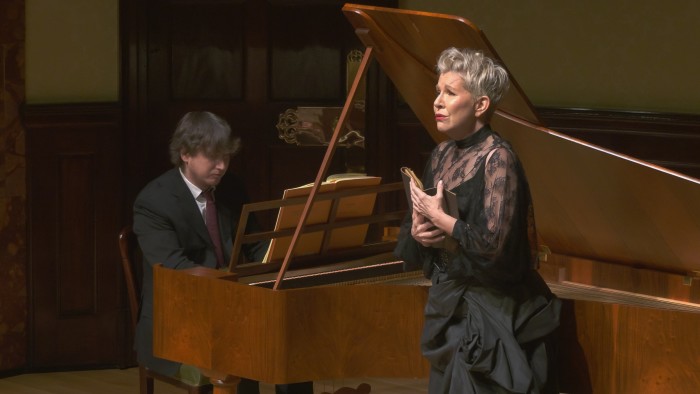Summarize this content to 2000 words in 6 paragraphs in Arabic Unlock the Editor’s Digest for freeRoula Khalaf, Editor of the FT, selects her favourite stories in this weekly newsletter.Around 70 minutes in performance, a setting of two dozen songs, Schubert’s Winterreise is the Everest of the song repertoire. Its winter journey is epic in scope, way beyond its relatively compact form, taking us to a bleak land where the skies are clouded by melancholy and thoughts of suicide.Any song recitalist of repute wants to scale its summit. Not many, though, would sing it twice in one evening. Hearing that her advertised recital had quickly sold out, Joyce DiDonato suggested adding another; a repeat performance an hour later was the result.That meant a lot of trudging through the snow for one evening. An enthusiast who had been present at both confirmed that the later performance was the more emotional of the two.There are different ways of squeezing the emotion out of Winterreise. A generation ago, Brigitte Fassbaender, the cycle’s leading female interpreter of her day, focused on the words, pushing the intensity to breaking point. One crawled out of the recital hall on one’s knees.DiDonato sets out with a different range of vocal gifts. Her lyric mezzo-soprano, now in its prime, offers an opulent palette of sounds: a lambent, gleaming top, ominously dark lower notes, everywhere beauty of tone, amplified by Wigmore Hall’s fine ambience. The contrasting verses of “Frühlingstraum” went from radiant hope to trenchant, dark, chest notes, as reality bites. The cries of weeping at the end of “Letzte Hoffnung” reached up into higher strata of luminosity.The texts were not ideally clear, which was partly due to the generous halo the Wigmore puts round the voice. That made the emotional journey less specific, but not less powerful: the encounters along the way, with the mail coach, the crow, the barking dogs, were vividly present and the intensity of DiDonato’s involvement was never in doubt. She sang as if reading from a book, sometimes seated at a desk, which added a suggestion of dramatic context, not to mention being useful for keeping the words to hand.Having a fortepiano for the accompaniment is still a novelty. Maxim Emelyanychev, more usually seen as a conductor, made the most of the instrument’s lighter touch. Speeds were a touch swifter than usual and the pictorial elements of the piano part, from the lure of the will-o’-the-wisp to the encircling flight of the crow, gained in realism. DiDonato’s recording of Winterreise has a conventional piano accompaniment, so this felt fresh and new, a Winterreise on its own terms.Nobody usually dares to sing an encore after the cycle’s bleak ending, but DiDonato did. Even purists could not complain following her beautiful singing of Strauss’s “Morgen!” — a ray of hope after the darkness.★★★★☆wigmore-hall.org.uk
rewrite this title in Arabic Joyce DiDonato brings vivid intensity to Winterreise — review
مقالات ذات صلة
مال واعمال
مواضيع رائجة
النشرة البريدية
اشترك للحصول على اخر الأخبار لحظة بلحظة الى بريدك الإلكتروني.
© 2025 جلوب تايم لاين. جميع الحقوق محفوظة.





